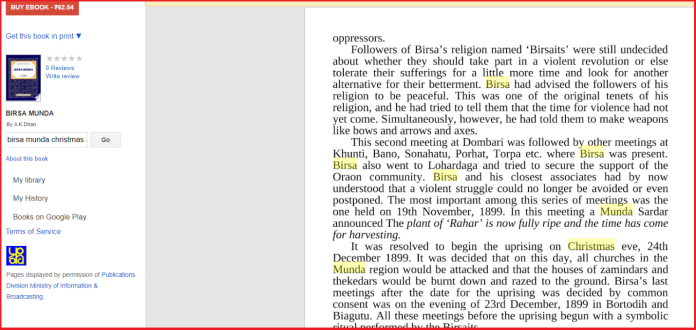What is the best way to pay tribute to Bhagwan Birsa Munda on his birth anniversary? The story of his life, which was cut short at the tender age of (less than) 25 years, gives us some clues.
As a child, Birsa Munda was baptized and raised as “Birsa David” at a school in Jharkhand run by Christian missionaries. Many tribals at the time had to convert thus, as a precondition for receiving an education in missionary schools. This was in the 1870s and the 1880s, when oppression by Christian missionaries, obviously patronized by the British colonial government was at its peak.
On growing up, he cast away the name of “Birsa David” and decided to return to his original faith. The Church at the time extracted tributes from the public, leading to immense hardship among the much oppressed and impoverished people. He decided to start an uprising.
Read: Birsa Munda, a tribal legend who was a nightmare for Christian missionaries during the British Raj
Matters came to a head-on Christmas eve in December 1899, when Birsa Munda and his followers rose up against the Church and landowners patronized by the imperial government. This is recorded in his official biography by A K Dhan from the Publications Division of the Ministry of Information and Broadcasting.

He was captured by the British government and died in a jail in Ranchi soon after, laying down his life before reaching his 25th birthday.
There is a lot to unpack here. The first is the shameful history of oppression of tribal people by the Church in India. How many people even know about this?
The second is the pain of Indian people being uprooted from their original belief system and converted by missionaries. This is a form of aggression and Birsa Munda clearly understood it as such. Almost one hundred and twenty years after his death, have we as a nation realized it properly even today?
No. In fact, the popular discourse around Birsa Munda has often painted him as an icon of tribal separatism. This amazing Orwellian feat has been achieved by collusion between leftists, missionaries and the ‘secular’ establishment. On the ground in Jharkhand, missionaries and their allies often use his name to pit tribals against ordinary Hindus!
Could there be a better day than Birsa Munda’s birthday to push for a nationwide anti-conversion law?
The identity of the Indian nation is anchored in its traditional beliefs. These beliefs constitute our identity, which is as much a legacy as any other form of wealth. An organized campaign to uproot our people from this identity is no different from colonial plunder of the riches of India.
Is an anti-conversion law against the principle of secularism? Of course not. This is like saying that rejecting British colonialism is against free trade or capitalism. The British Empire required India to become a captive market for British made goods. This is how the wealth of India was systematically pumped out. A sovereign India does not reject trade relations with the UK. Instead, we trade out of free choice, which enriches both our economies. Free trade only works if it makes both parties better off.
Secularism is supposed to work the same way. Our traditions are our cultural wealth. We can engage actively with other nations and other cultures. The free exchanges are supposed to make everyone better off. That’s real secularism. But the organized missionary cartels and the lack of awareness in India means it becomes one-sided plunder, akin to the dumping of Chinese goods in the Indian market.
One hundred and twenty years ago, the young hero Birsa Munda rose up against this cultural plunder. No better way to honour his memory than to make a final push today for a nationwide anti-conversion law.



